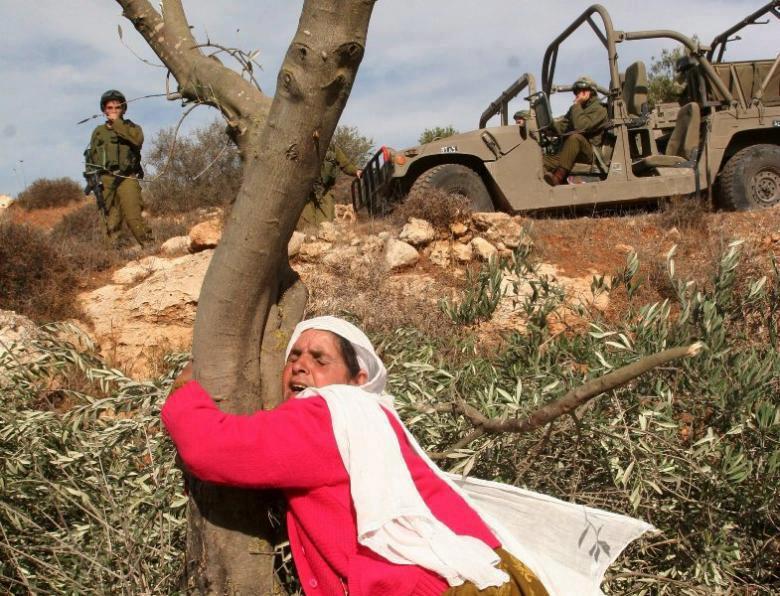
Palestinian woman holding onto olive tree uprooted by armed Israeli army – Reuters
While the terms Environmental Justice and Environmental Racism were coined in the United States, these issues are by no means limited to the borders of this country. On the contrary, they can be more strikingly severe and less subtle outside of the US. This is not to say that the United States is absolutely out of the equation. The United States dumping waste in India, American and European companies dumping toxic waste on the shores of Somalia, fueling numerous conflicts and problems in the country, as well as the US exporting toxic waste to be treated by African companies for as little as $3 a ton (in comparison to a cost of $1250 a ton in the US), are all examples of international environmental racism against a poor, predominantly of color population. However the issue this post will handle is none of the above, instead the focus will be the Palestinian case.
One of the main founders of the State of Israel David Ben-Gurion wrote that “we must conquer the sea and the desert, for these will provide us with room for new settlers and will serve as a laboratory for the development of new forms of economic and agricultural endeavor” in reference to what the emerging state should do in Palestine. This was written in 1944, four years before the official establishment of the State of Israel in 1948. Since then, the Palestinian – Israeli struggle has taken many shapes and forms, environmental violence and racism being one.
Traditionally, Palestinians have cherished their olive trees which they planted everywhere. Due to that connection, olive trees became a target for settler – meaning executed by settlers: Israelis living in settlements within the West Bank – environmental violence. On June 15, 2013, a Palestinian Authority (PA) official reported to Ma’an News that settlers have set fire to over 300 olive trees, while also attacking the land owners and the Palestinian citizens who were trying to put the fire out. When the Israeli Defense Forces (IDF) arrived to the site, they prevented Palestinian firefighters from reaching the fire as well. This is one among many incidences of tree burning and uprooting. According to an Oxfam report, about 800,000 olive trees in Palestine have been uprooted or burned since 1967.
Another issue which is even more severe and more life-threatening to Palestinians is the issue of natural water resources. Kafr Dik is a small Palestinian village of 5500 people. Historically, a natural spring has been the village’s resource of water. According to Friends of Earth International’s Environmental Nakba (catastrophe) report, the villagers have been denied access to the spring by Israeli forces for the last two decades. After pressure, Israel now provides the villagers with twenty eight cubic meter per day. The access point to the water is near an industrial settlement, thus, the water is usually contaminated. A study done by Al-Haq Organization – an organization that records human rights violations against Palestinians – shows that one Israeli settler gets 369 liters of clean water, while a Palestinian citizen in the west bank gets 73 liters per day, thirteen of which are contaminated. Lastly, a Palestinian citizen in the Gaza Strip consumes 90 liters of water per day, only ten of which are clean water. This is due to Israel’s control and monopoly over water natural resources in the West Bank, and its control over the borders and the coast in the Gaza Strip. Last month, Israel cut off the water supply off of around 45,000 Palestinians living in refugee camps around Jerusalem for three days in order to force the residents into contracting with the Jerusalem Municipality, which would make them pay a lot more for their water. There have also been issues in regards to waste dumping, land confiscating, the drying of Lake Hula, destruction of farms, and the list extends. These examples are just few examples among many others showing Israeli practices that targets Palestinians by targeting their environment.
The reason why this is environmental racism is because there is a powerful state oppressing a less privileged state through the destruction of their environment, simply for having an Arab Palestinian population. It is possible to argue that the Palestinian – Israeli issue is a lot more complicated, and interpreting these actions as environmental racism and environmental violence is a simplistic view, since so many of these actions are political pressure tools. However, with that argument in consideration, this can still be considered environmental violence and racism as well as a form of group punishment targeting a people solely because of their ethnicity and race, and not because of their political views, actions or involvement. The Palestinian – Israeli case is one of the most complex political issues in modern and recent history, and the subtle environmental aggressions are often ignored in favor of the more visible ways of violence. However, when one third of the income in the West Bank comes from agriculture, the destruction of the environment and the water resources becomes equivalent to the destruction of livelihoods of these people, and therefore, this issue becomes more crucial.